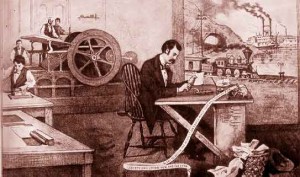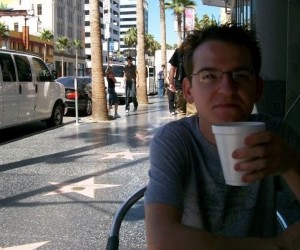Adam L for 9/24
September 22nd, 2009
I’m very interested in the anti-capitalist ideas in “A Song for Occupations.” Parallels between this poem and “Song of Myself” are drawn in their similar titles (though not designated by Whitman), first and second person voices, and pervasive egalitarian themes. The poem begins with a call for universal and personal human intimacy, but uses the key word “possess” to establish a dual political theme. The question asked in the first lines will become clearer as the poem unfolds: What is “the best I possess” or “the best you possess”? It becomes inarguably clear by the end of the poem that Whitman is no Material Girl, and I am left with suspicions that he may have been an avid reader of Marx at the time of writing this work.
In the very next line the dual ideas persist: “This is unfinished business with me.” While continuing the celebration of the essential self (“me as I am”), and the “contact of bodies and souls,” as he did in “Song of Myself,” Whitman also hints at the competing worldview value-system that he undermines in the lines that follow: Capitalism, the valuing of money over the essence of humankind, the viewing of people and objects of nature only in terms of enterprise. “Were I to you as the boss employing and paying you, would that satisfy you?” The question implies Whitman’s own dissatisfaction with the effect money has had on the design of human relationships. He describes the inequality of a Capitalist economy as defining the human as either “servant” or “master,” and with “neither” of which does he choose to identify.
“I take no sooner a large price than a small price.”
“I will be even with you, and you shall be even with me.”
He expresses a deep sympathy with the working classes and the underpriveleged, identifying with the “workman” and “workwoman,” calling for the self percieved social equality of the “drunk,” the “thief,” the “diseased.” Whereas Whitman addresses his own soul in “Song of Myself,” here he calls out to the “Souls of men and women,” in an attempt for this poem to be far more political, a rally cry to the proletariat. (Side note: “or that you was once drunk” What’s this improper grammar about?)
One of the most obviously anti-capitalist lines is on page 91, where Whitman writes, “And send no agent or medium…and offer no representative of value–but offer the value itself.” Clearly the “representative of value” is money. Again, on page 92, one of the most revealingly anti-capitalist passages, which attacks the greed of enterprise and the mechanization of the human body by enterprise:
The light and shade–the curious sense of body and identity–the greed that with perfect complaisance devours all things–the endless pride and outstretching of man–unspeakable joys and sorrows,
The wonder every one sees in every one else he sees….and the wonders that fill each minute of time forever and each acre of surface and space forever,
Have you reckoned them as mainly for a trade or farmwork? or for the profits of a store? or to achieve yourself a position? or to fill a gentleman’s leisure or a lady’s leisure?
These questions are direct, and starkly revealing of the impulses which were, before, underlying a continued conversation started in “Song of Myself.” In short, Whitman summarizes himself on page 93: “The sum of all known value and respect I add up in you.” To Whitman, the value of money, of business, of things one can own, of employees, is incomparable to the value of the essential individual, and the society he lived in clearly made him feel as though pointing this out was important.
Adam L’s Image Gloss for September 17
September 15th, 2009

“The jour printer with gray head and gaunt jaws works at his case,
He turns his quid of tobacco, his eyes get blurred with the manuscript;” (39)
In this context, jour is used as “a colloquial abbreviation of journeyman” (Wordnik). A journeyman can be described as “one who has fully served an apprenticeship in a trade or craft and is a qualified worker in another’s employ,” thus able to earn “a full day’s pay for his work” (Wordnik).
At first I had assumed that the use of “jour” in the line I selected from “Song of Myself” referred simply to the French word for “day,” perhaps signifying a printer of a daily publication. But the discovery that its use is more likely an abbreviation for “journeyman” is interesting, as Whitman himself “worked as a journeyman printer for several New York newspapers, before ultimately becoming a journalist and editor in his own right” (Lehigh University).
The inclusion of this subtle self-image in one of the many visual catalogues in this poem resonates with his egalitarian assertions, that he is the everyman, the same as the carpenter, children, pilot, and deacons described on the same page.
The image above is sourced from Discovery Press, which offers additional insight into Whitman’s own career as a journeyman printer. “It was common for a journeyman printer to be called to temporary duty as a newswriter or reporter,” which often led to a growing career editing, publishing, and journalism, as was also the case with Whitman’s contemporary, Samuel Clemens.
Song of Adam
September 8th, 2009

I exist as I am, that is enough,
If no other in the world be aware I sit content,
And if each and all be aware I sit content.One world is aware, and by far the largest to me, and that is
myself,
And whether I come to my own today or in ten thousand
or ten million years,
I can cheerfully take it now, or with equal cheerfulness I
can wait.
Even though the lines I’ve chosen to compliment my own frontispiece follow shortly after the line “I do not trouble my spirit to vindicate itself or be understood,” I think an explanation of my choice is justified by the lines, “Do I contradict myself? Very well then…I contradict myself.” Like Whitman, I’m comfortable with being a hypocrite. Anyway, the lines I’ve chosen describe a cosmic sense of self esteem, a solipsist sense of the world and self as interchangeable concepts, and the cool, “cheerful” ability to accept what life is and what it isn’t. These lines compliment my photo – it is a shot of me having coffee on the Walk of Fame in Hollywood, CA. I’m in the shade and in the corner, and Tinseltown is really the subject of the photo. I’m a nobody on a sidewalk that celebrates hundreds of somebodies. But I’m having a decent time, basking in the warm weather, the smell of cheap coffee, and my nobodiness. “That is enough,” and “I sit content.”
Hello world!
September 3rd, 2009
Welcome to Looking for Whitman. This is your first post. Edit or delete it, then start blogging!
First Test Post
September 3rd, 2009
Wiggity wiggity Whitman
